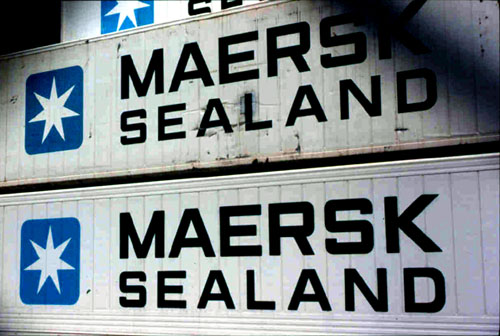
Peregrine981
The ransomware Petya, which started spreading in Ukraine, Russia and Europe and has already reached America and Asia, continues to find victims among large companies. Thus, the world's largest container operator, Danish company A.P. Moller-Maersk, who earlier this morning reported problems in the operation of only one of its cargo terminals in Mumbai, had already announced complete shutdown of the entire APM Terminals computer system, which operates terminals in 76 ports in 59 countries around the world. Now the company is working on a technical recovery plan with the support of key IT partners and experts on cybersecurity. As Maersk’s commercial director Vincent Clerc told Bloomberg, their container ships are working, communication with them is operating, the crew is safe, but the company cannot accept applications from customers. "Our portal does not work, we cannot accept new orders until its work is restored", he said, adding that customers whose deliveries are already on the way have to be prepared for delays in delivery. Mr. Clerc, however, is sure that this problem has not yet reached a sufficient scale to affects world trade. "It only affects our work," he said. The company stressed that A.P. Moller-Maersk has not yet paid any ransom and does not intend to do so.
The Petya virus also affected shares of technology companies, most of which rushed down. NVIDIA Corporation shares (3.66%) demonstrated the biggest drop, followed by Symantec (2.6%), Alphabet (Google’s parent company) - 2.47%, and Microsoft, Adobe Systems, Deutsche Telecom, Apple and Sony. The NASDAQ stock index fell 1.6%.
Recall that the virus attacked computers from many countries, including the United Kingdom, the United States and Israel.
Among the victims is also American biopharmaceutical giant Merck, said a well-known expert on cyber security Brian Krebs.
The virus was designed to destroy data, not for extortion. This is confirmed, for example, by the fact that the bitcoin wallet number does not change, as does usually with ransomware, says Nicholas Weaver, a security researcher at the International Institute of Computer Science and a lecturer at the University of California at Berkeley.
"I have a moderate certainty that this was a deliberate, evil, destructive attack. The best way to make sure of this is that the Petya payment infrastructure is a banal screen", Nicholas Weaver said.
The virus hit targets in Spain, France, Brazil, the United States and other countries. In Asia, problems were reported by users from Israel, China and India. British advertising company WPP reported an attack on their IT systems in several departments. Also, the virus was fixed and rendered harmless in Australian computer systems.
source: bloomberg.com
The Petya virus also affected shares of technology companies, most of which rushed down. NVIDIA Corporation shares (3.66%) demonstrated the biggest drop, followed by Symantec (2.6%), Alphabet (Google’s parent company) - 2.47%, and Microsoft, Adobe Systems, Deutsche Telecom, Apple and Sony. The NASDAQ stock index fell 1.6%.
Recall that the virus attacked computers from many countries, including the United Kingdom, the United States and Israel.
Among the victims is also American biopharmaceutical giant Merck, said a well-known expert on cyber security Brian Krebs.
The virus was designed to destroy data, not for extortion. This is confirmed, for example, by the fact that the bitcoin wallet number does not change, as does usually with ransomware, says Nicholas Weaver, a security researcher at the International Institute of Computer Science and a lecturer at the University of California at Berkeley.
"I have a moderate certainty that this was a deliberate, evil, destructive attack. The best way to make sure of this is that the Petya payment infrastructure is a banal screen", Nicholas Weaver said.
The virus hit targets in Spain, France, Brazil, the United States and other countries. In Asia, problems were reported by users from Israel, China and India. British advertising company WPP reported an attack on their IT systems in several departments. Also, the virus was fixed and rendered harmless in Australian computer systems.
source: bloomberg.com


















